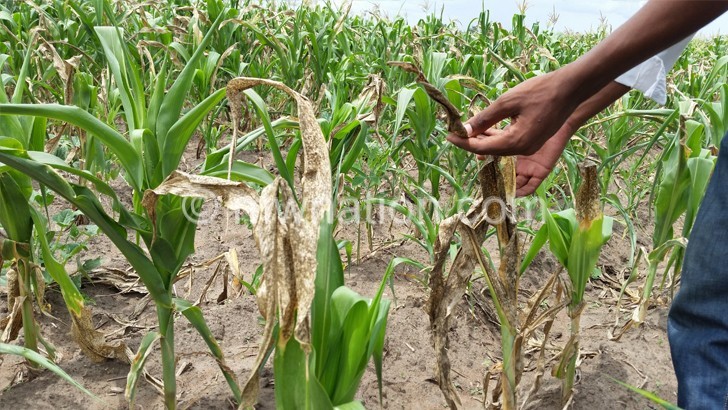Worms threaten Goodall’s hopes
Minister of Finance, Economic Planning and Development Goodall Gondwe should be a worried man as combined effects of prolonged dry spells and an outbreak of fall armyworms threaten food production and his growth targets in the agro-based economy.
Reduced food production puts under threat Gondwe’s ambitious economic growth projection of between five and six percent.

Ministry of Agriculture, Irrigation and Water Development spokesperson Osborne Tsoka said in an interview yesterday about 12 percent out of a total of 1.7 million hectares (ha) are affected by the dry spells.
But he said the ministry was still assessing and compiling figures in readiness of an official first assessment report of the crop situation expected to be released later this week.
While describing the 12 percent of affected crops by the dry spells as minimal, Tsoka said it was too early to project whether the country will have a food deficit or surplus in the 2017/18 farming season.
He said: “Right now, effects cannot be told because assessments are being made. Once compilations and assessments are made, interventions will be made which might include intensifying irrigation, planting of crops in affected areas and planting of other crops like sweet potatoes.”
In the 2017/18 budget statement, Gondwe projected the economy to grow between five and six percent, a stronger showing than the 2.7 percent in 2016 and 3.3 percent chalked in 2015.
The years 2015 and 2016 were largely affected by poor crop harvest that cumulatively saw agriculture output slump by 35 percent.
Malawi is an agro-based economy with the contribution of agriculture to the gross domestic product (GDP) pegged at least 30 percent.
In 2016/17 farming season, maize production jumped by about 35.9 percent to 3.2 million metric tonnes (MT) compared to 2.3 million MT in 2015/16 season. Ironically, the 2016/17 season was also affected by fall army worm attack and a chaotic Farm Input Subsidy Programme (Fisp).
On fall army worms, the Ministry of Agriculture, Irrigation and Water Development said the pest has affected over 270 000 hectares (ha) of maize and other crops in districts President Peter Mutharika declared disaster areas last December.
Tsoka said government was prepared to fight the fall army worms through different strategies to deal with the problem.
He said: “For the outbreak of the fall armyworms, the ministry was prepared. It has already supplied recommended chemicals and it has also done trainings with agriculture extension officers [AEOs]. Aside from that, government is also in a process of procuring more chemicals that will help in controlling the impact of the fall armyworms.”
Commenting on the developments, agriculture expert Tamani Nkhono-Mvula described the situation as worrisome because in some parts of the country, especially the Southern Region, crops have reached a permanent wilting point.
He said: “What I can say is that the situation is worrisome. The only option is to replant in some other areas where the crops have not reached a permanent wilting point as evidenced in some other parts. For now we can only hope and pray that rains come more, especially in the Central Region where most of the maize comes from.”
Nkhono also said the expectation is that there will be a true reflection from an assessment report expected to be released this week or next week by the line ministry following assessment from surveys underway.
In a separate interview, Farmers Union of Malawi (FUM) president Alfred Kapichira Banda said farmers have already declared that there will be low harvests whatever the case.
He said: “In terms of dry spells, we as farmers have concluded that our harvest will be very low. We urge other farmers to go to dambo areas and plant early maturity crops like cassava and sweet potatoes.”
Banda also called on government to revamp dams that were constructed long time ago and are not in use so that they may utilise irrigation farming for the country’s survival.
Districts affected by fall armyworms and declared as state of disaster include Nsanje, Chikwawa, Mwanza, Neno, Phalombe, Chiradzulu, Blantyre, Thyolo, Mulanje, Zomba, Balaka and Machinga in the Southern Region; Lilongwe West, Dedza and Ntcheu in the Central Region and Mzimba North, Rumphi, Nkhata Bay and Chitipa in the North.
Minister of Agriculture, Irrigation and Water Development Joseph Mwanamvekha is also on record as having told The Nation in December that development partners have promised to assist the country in dealing with fall army worm outbreak. n





